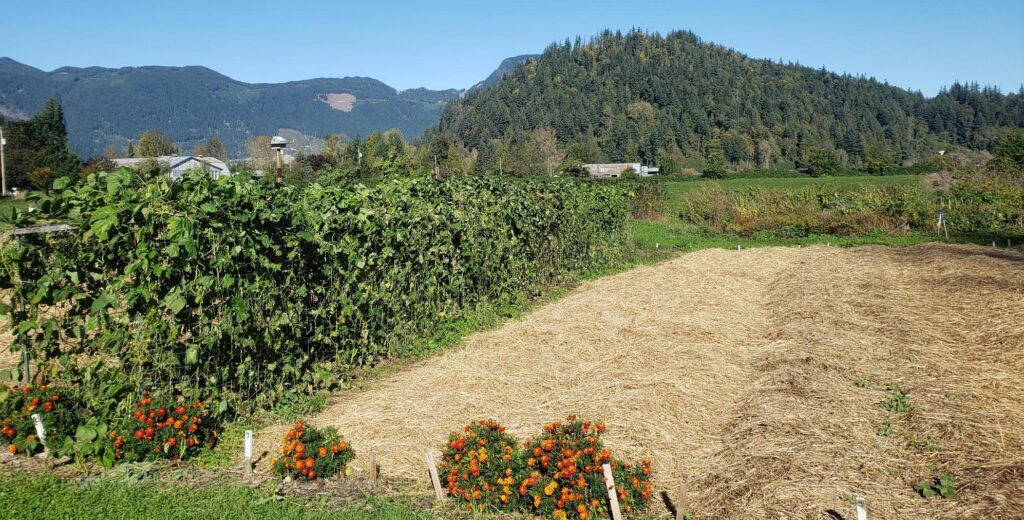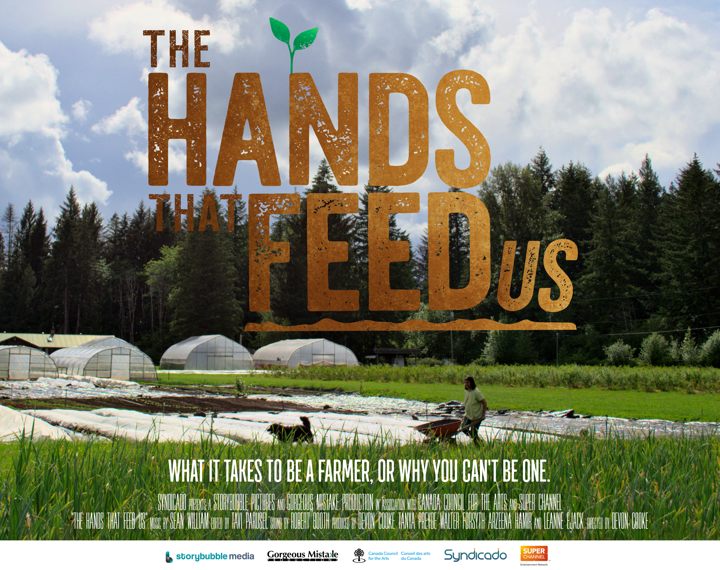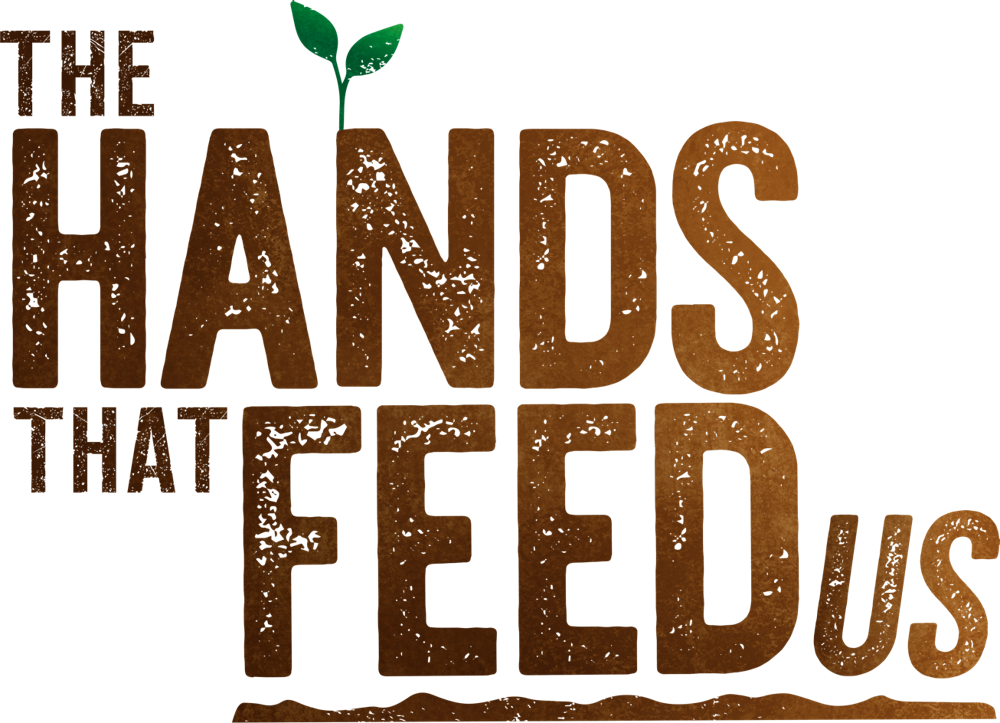The film is done! … !!!!!
I started obsessing over farmers not being able to make money sometime in 2015. In 2020, I drove across Canada with a camera, living and working on five different farms as I sought to find out how farmers actually do earn a living. I’ve been announcing the impending release of the film seemingly ever since. And now I can actually say it: The Hands that Feed Us is done!
Or, I should say, the film is done. But my original goal for The Hands that Feed Us wasn’t just to make a documentary. It was to improve the economic situation for farmers — to try and make farming a financially viable occupation. The documentary is just a way to shine light on the matter. So now, almost a full decade after I started worrying about the plight of farmers, I’m finally ready to do that. I can’t say I’ve solved the farm income crisis, but the film is a conversation piece, and I intend to have a lot of conversations! More on that below…
In the meantime, if you just want to see the film, you’ll be able to do that in November: The film will be available on Super Channel, which you can subscribe to as a streaming channel on Amazon Prime and Apple TV, or on good old-fashioned cable TV. The film will also be premiering on October 24th at Devour! Film Festival in Wolfville, Nova Scotia. I’ll be there in person for a Q&A after the screening.
While you’re waiting for November, you can whet your appetite (or your friends’) by watching the trailer.
Happy Thanksgiving from Abundance Farm

After four and half years sitting in front of my editing computer, I’m finally back on a farm. When I finished filming in 2020, I was in the best shape of my life after living farm life for eight months. It took three months to lose it all, and I’ve been in the worst shape of my life ever since. Let it never be said that making a film is good for your health. Since August, I’ve been doing farm work again, starting with a couple days a week, but I’m now living at Abundance Farm full time. Once again, my body is transforming for the better.
Abundance Community Farm is different from the farms that feature in the documentary. It’s a community farm, which means much of the work is done by volunteers who come in from the city one or two days a month. There’s a small core team on the farm full time, but the farm is intended to be more of a place to live than a livelihood. No one is concerned with the farm making a lot of money. The single acre in production yields an abundance of vegetables for about forty community members, and, if you ignore the up-front investment to buy the land and buildings, it seems to roughly break even financially.
Being here is an interesting testimony to how much I learned in the eight months I was on the road. I find I’m much faster and able to take on a lot more than most of the other volunteers. I’ve learned how to be efficient in my movements, and, while I have to ask what the farm’s specific procedures are, I don’t have to ask when a bean is ready for picking or how to identify weeds. I’ve been closing beds for the winter: weeding them out, spreading compost for soil fertility, then mulching them with a layer of hay to keep them warm and weed-free over the winter. It takes me about three hours to do a row.
I think the farm appreciates how much I can get done, but I also have to be careful how much pride I take in my efficiency. On a regular farm, speed means efficiency and, ultimately, the difference between making a profit or losing money. Here, the priorities are different. This is a place for people to learn how things grow, or, in many cases, for their kids to learn where food comes from. Speed is not the point. Connection to land and community is the point, and if I go too far into ‘work mode’, I lose that point of connection with the other people who are here. Doing things efficiently isn’t as important as giving the people here a chance to learn and experience the farm at their own pace.
All of this is a reminder to me that there are different ways to cope with the fact its difficult for farmers to make money. The path chosen at Abundance is to not even try. The farm has a benefactor in Amir Masoud Niroumand, who owns the land and who had the vision of a farm where the community works the land. Of course, he doesn’t want to lose money every year, but running the farm as a for-profit business isn’t the path he has chosen.
Up next: Premieres and test screenings
Traditionally, the first phase of a film’s release is a festival run. The goal is to get into prestigious festivals where the film will be seen by international buyers, and hopefully make a sale or two. I would love for that to happen — it would help pay for the five years or so that I’ve dedicated to making it — but simply selling the film so it can be seen in faraway places doesn’t actually advance my goal of raising awareness and having discussions here in Canada. And it may not be all that realistic. Thus far, the film hasn’t gotten into any ‘big’ festivals, and I’ve noticed a marked difference in how ordinary people and ‘film people’ react to hearing about the film: Ordinary people are way more enthusiastic! Maybe film people have seen too many films and are cynical about what they get excited about, but whatever the reason, I haven’t had much luck getting into the ‘big’ festivals.
If I’m honest, I’m not that surprised. I’m a first-time filmmaker, I don’t have an exising audience, and I haven’t really made a ‘festival film’. I didn’t design the film to do well in that way. I’m confident I’ve made a great film — the reaction from the small groups that have seen it already have convinced me it’s not a dud — but I didn’t set out to impress a film festival audience. I made the film for farmers, and the people who care about where our food comes from. The film will be premiering at Devour! Film Festival: A festival that is specifically about food. And, much to the chagrin of my distributor, who would rather see the film premiere at a festival that can make sales, Devour! was my first choice for where I wanted to premiere the film.
Another challenge with getting into ‘big’ festivals is that they tend to program films that aren’t otherwise available … and the film will be streaming and on cable on Super Channel— in Canada at least — by November. That’s a very tiny window for the film to play at a ‘big’ festival. So, instead, I’ll be switching gears, and submitting the film to smaller festivals: Rural festivals, food-focussed festivals, farm-focussed festivals. There are plenty of festivals out there that will want to program the film. They just aren’t the festivals where I’m likely to make a sale.
In addition, I’m doing some test screenings where I can develop my facilitation skills and ultimately figure out how I will host discussions around the film when I take it on tour. At the moment, I’m imagining three possibilities: A conventional Q&A where I screen the film and answer questions for half an hour immediately afterwards, an afternoon “town hall” where I facilitate a two-hour discussion about how the issues in the film show up in that specific community, and a weekend workshop that is more action-oriented and is designed to leave behind a more permanent organization. Once I’ve figured out the format of these discussions, I’ll start planning in earnest to take the film on tour for next year.
How can I watch the film?
- October 24th, 2PM AST: Devour! Film Festival @ Al Whittle Theatre, Wolfville, Nova Scotia
- starting in November: Stream the film on Super Channel Plus, or get Super Channel through Amazon Prime or Apple TV or your local cable provider.
- November 25th, 7PM PST: World Community Film Festival (special screening), Courtenay, B.C.
- TBA: At least one friends-and-family screening in Metro Vancouver that I will host personally. Watch for info!
If you can’t make it to any of those dates, there will be many more festival screenings as our release kicks into gear. In the meantime, you can watch the trailer here:

In addition, I’ll be taking the film on tour across Canada, and I might even make it to your town! I’m still planning the schedule, so there are no details yet, but if you’d like me to bring the film to your area e-mail me a request at devon@thehandsthatfeedus.ca.
How can I help?
- Tell your friends! You can share the trailer if you like, but the most important thing is to tell them why you are excited about the project, and why you think they would be interested too!
- Host a screening in your community (or suggest an organization in your community to host) Send a message to devon@thehandsthatfeedus.ca; I’ll add you to a screening list.
- The tour needs partners. Please suggest names of groups that exist in your area! Specifically, I’m looking to partner with:
- Farms and Farmers
- Agricultural groups (e.g. 4H, National Farmers Union)
- Rural / County / Municipal governments
- chapters of Service Organizations (e.g. Rotary Club, Lions Club, church groups)
- Chambers of Commerce
